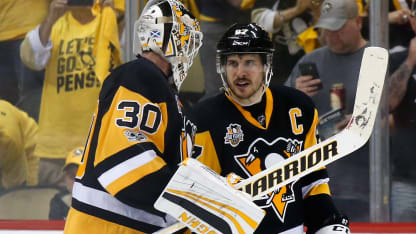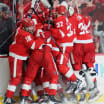The Penguins didn't make many moves after winning won the Cup last season by defeating the San Jose Sharks in the Final. Forwards Beau Bennett and Eric Fehr were traded, and defenseman Ben Lovejoy and third-string goalie Jeff Zatkoff left as free agents. Despite a rash of injuries this season, including to top-pair defenseman Kris Letang (who missed 41 games in the regular season and the entire postseason), defenseman Olli Maatta (27 games missed), defenseman Trevor Daley (26), forward Carl Hagelin (21), center Evgeni Malkin (20) and goaltender Matt Murray, who missed the first three weeks of the season and the first two rounds of the playoffs, the Penguins had players step up when called upon.
RELATED: [Penguins vs. Predators playoff preview | Five reasons why Penguins advanced]
Under Mike Sullivan, who took over as coach on Dec. 12, 2015, the Penguins finished 50-21-11 this season, second in the Metropolitan Division. They are 83-37-16 (.610 winning percentage) during his tenure in Pittsburgh. Center Sidney Crosby had 89 points (44 goals, 45 assists), center Evgeni Malkin had 72 (33 goals, 39 assists), and forward Phil Kessel had 70 (23 goals, 47 assists) to lead the offense. But the Penguins also got surprising contributions from Justin Schultz, who had an NHL career-high 51 points (12 goals, 39 assists) and was their highest-scoring defenseman, and rookie forward Jake Guentzel, who had 33 points (16 goals, 17 assists) in 40 games. Also, goaltender Marc-Andre Fleury graciously accepted a reduced role before stepping in for the injured Murray to help Pittsburgh advance to the conference final.


















